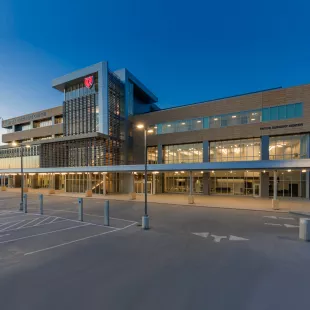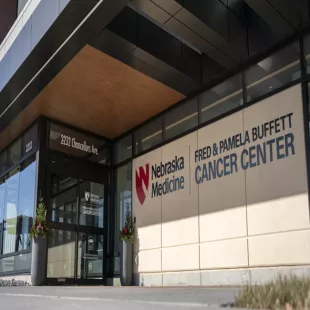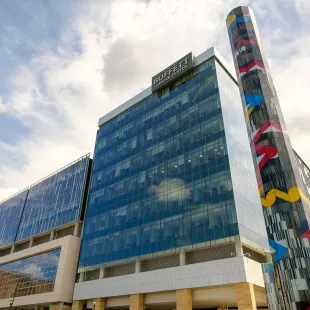The Brain and Spine Cancer Center program at Nebraska Medicine has a team of leading experts specializing in the diagnoses, treatment and support of patients with brain tumors, spine tumors and tumors involving the nervous system. Our fellowship-trained expertise paired with the leading edge therapies such as, advanced imaging, brain mapping, targeted therapy are steadily improving how we treat brain cancers. Patients come from all over the region for consultations, treatment and second opinions.
Malignant Cancers
We focus on malignant cancers that begin in your brain (primary cancer), or cancers that spread to the brain (metastatic) brain and spinal cord tumors, including:
- Gliomas
- Astrocytomas
- Oligodendrogliomas
- Ependymomas
- Medulloblastoma
- Neuroblastoma
Malignant Skull-Based Tumors
- Carcinomas
- Sarcomas
- Esthesioblastoma
- Carcinoid
- Mucosal Melanoma
We Also Treat Non-cancerous (Benign) Tumors:
- Meningioma
- Acoustic or Vestibular Schwannomas
- Pituitary Adenoma
- Hemangioblastoma
- Craniopharyngioma
- Choroidplexispapilloma
Advanced Ways We Treat Brain Cancers
Our neurosurgeons are experienced at taking on some of the most serious and complicated cases. Some of those involve tumors in or within close proximity to the areas of the brain that control speech, motor and sensory functions. Among the techniques employed is awake brain surgery, in which the patient is awake during portions of the operation in order to respond to questions and stimulations.
Brain Mapping
Nebraska Medicine is also one of a small number of hospitals across the country to house the magnetoencephalography (MEG) scanner, the most advanced technology available to precisely map areas of the brain where activity is occurring. With this extremely accurate mapping ability, the MEG allows doctors to pinpoint atypical brain developments or brain lesions and can assist surgeons in performing highly targeted brain operations.
Additional Therapies We Use for Treating Brain and Spine Cancers
- Chemotherapy
- Personalized Medicine (Targeted Therapy)- A treatment plan that is developed based on your genetics, specific tumor type and more.
- Optune Therapy - a wearable, FDA-approved device that provides ongoing therapy
- Radiation Therapy
- Stereotactic Radiosurgery - A non-invasive radiation therapy used to treat brain tumors.
Deep, Broad Expertise and Experience
Our team includes the only fellowship trained neuro-oncologist in the state and a fellowship trained neurosurgical oncologist who specialize in brain and spine tumors. Every patient seen at one of our locations has a full team of specialists working together to create an individualized treatment plan, including:
- Head and Neck Surgery
- Neuroendocrinology
- Neurosurgical Oncologists
- Neuro-Oncologists
- Neuroradiologists
- Neuropathologists
- Neuropsychologists
- Radiation oncologists
- Speech Therapists
- Physical and Occupational Therapy
The multidisciplinary team approach combined with the latest diagnostic testing and key research findings offers each patient the best possible care available in the region.
In addition to some of our staff receiving previous fellowship training at top cancer institutes such as the MD Anderson Cancer Center, we also see the bulk of brain tumor patients in the region, meaning we get exposed to particularly rare, challenging-to-remove tumors many doctors will not come across in their lifetimes.
That matters when for example when being treated for a glioblastoma - which is the most common type of cancerous brain tumor in adults. Sometimes in the first few months after treatment you develop pseudo-progression - meaning the tumor appears larger and brighter on some scans. This phenomenon can easily be misinterpreted by someone unfamiliar with these cancers as proof the treatment isn't working.
We regularly remove tumors in or within close proximity to the “eloquent areas” of the brain that control speech, motor or sensory functions. Among the techniques employed is awake brain surgery where the patient is awake during portions of the operation in order to respond to questions.
A multidisciplinary neuro-oncology tumor board also meets weekly to collaborate and formulate a clear and comprehensive plan for your care and treatment. That means it's not just one doctor advising you, but a vast team of experts.
All patients undergoing cancer treatment with Nebraska Medicine have access to our Infusion Center at the Fred & Pamela Buffett Cancer Center, which serves as a treatment center and urgent-care-type facility for those battling cancer.
Research
Many of our specialists are very involved in research to find new treatments and cures for this disease. Cooperative and Investigator Initiated Clinical Trials, meaning we aren't just taking part in clinical tries going on in other locations, but we initiate them. To learn more and support our research projects visit the links here:
The Brain Cancer Research Fund - Gifts to this fund allow us to start pilot projects, conduct cross-disciplinary research, fund post-doctoral students participating in studies, host applicable lectures or attend meetings for the collaboration and advancement of novel ideas in the pursuit of improving brain tumor treatments and outcomes.
The Brain and Spine Cancer Research Fund - Gifts to this fund affords our doctors the opportunity to take part in some of the most current clinical trials, giving patients early access to the newest drugs and most leading-edge treatment options before they become widely available.
Cancer Support Services
Finding out that you have cancer can be a very emotional and difficult time. You will likely have many questions and issues to work through. We will be with you every step of the way. Nebraska Medicine offers a host of to help you with your physical, emotional, educational and financial needs. For more information visit the cancer support services page.
The Brain and Spine Cancer Center has a brain tumor education and support group to provide support and knowledge to you and your family. Sessions may include information, resources, or expert speakers on various relevant topics. Participants are encouraged to talk and share their experiences and struggles and to celebrate their success.
We're Here for you Long After Your Treatment
Our Survivorship Clinic is designed to help you deal with the emotional and physical challenges cancer can leave behind such as fear of recurrence, physical and medical long-term side effects and helping you return to a normal life again. It will also help you transition back into the care of your primary care physician.
Our Locations
-

Ear, Nose, Throat (ENT) and Audiology at Lauritzen Outpatient Center
4014 Leavenworth St.
Get Directions
Omaha, NE 68105 -

-

Fred & Pamela Buffett Cancer Center - Nebraska Medical Center
505 S 45th St.
Get Directions
Omaha NE 68105
-
Brain and Spine Cancer Patient Resources
Find a list of trusted resources the spine team at Nebraska Medicine has put together for those struggling with brain and spine tumors.
View More -
Cancer support services
From support groups to wellness centers to help you with the physical and emotional changes you're experiencing, see a list of all our supportive services for cancer patients.
View More -
Cancer accreditations and awards
This is the best page to visit to see a running list of our accreditations and awards in the field of cancer treatment and research.
View More -
Cancer support groups and education
Learn more about the wide variety of support and educational groups for cancer patients and their families.
View More

